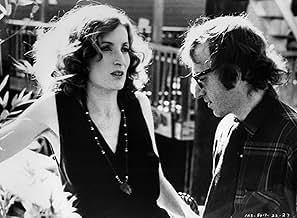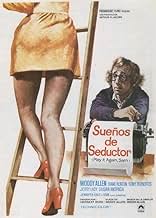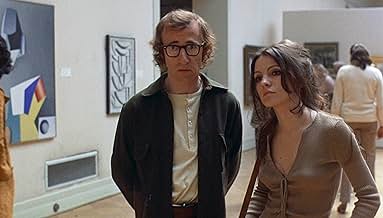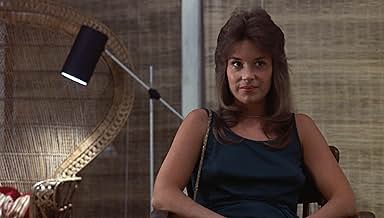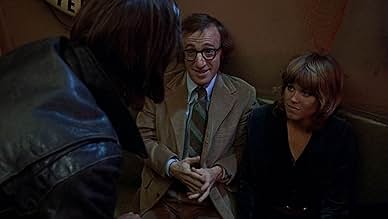A film critic obsessed with Casablanca (1942) seeks to get over his wife leaving him by dating again with the help of a married couple and his illusory idol, Humphrey Bogart.A film critic obsessed with Casablanca (1942) seeks to get over his wife leaving him by dating again with the help of a married couple and his illusory idol, Humphrey Bogart.A film critic obsessed with Casablanca (1942) seeks to get over his wife leaving him by dating again with the help of a married couple and his illusory idol, Humphrey Bogart.
- Awards
- 1 win total
- Discotheque Girl
- (as Suzanne Zenor)
- Taxi Hippie
- (uncredited)
- Real Estate Developer
- (uncredited)
- Biker
- (uncredited)
- Pedestrian
- (uncredited)
- COP #2
- (uncredited)
Featured reviews
The humour in this film is awesome and also amazingly funny. Scenes that see Woody Allen blunder his way through dates are hilarious, and Allen's dialogue is at its dry and witty peak. The scene in which he tells of a fight he had with two 'hairdressers' being an excellent example of his writing. Allen tends to play the same sort of character in all of his films, and the one here shows him doing that again. This would be a problem, if he weren't so amazingly good at it. As the man festers in his own pathos; we can really believe it, and this gives the film a great sense of believability and also offers up a prime example of Allen acting at his best. The film isn't a complete one-man show, however, as the underrated Tony Roberts, along with Diane Keaton also give grand performances. The movie tributes in the film are many, with most pointing to the great Casablanca - and this is a good thing as far as I'm concerned. On the whole, this is an intelligent, entertaining and hilarious movie from one of cinema's best comedians. Highly recommended!
Woody plays Allan Felix, a film critic who has just been dumped by his wife and sets off to fill the hole in his heart. "I'll get broads in here like you wouldn't believe," he tells himself. "Swingers, freaks, nymphomaniacs, dental hygienists." But when even the nymphomaniac complains about his getting fresh, he realizes it won't be so easy. Enter Bogart, appearing in a series of fantasy sequences, and Keaton, very much a part of his real life as one-half of the married couple that jumps in to help Allan out. Alone amongst women, she can see Allan as a worthwhile guy, especially with their shared love for apple juice and Darvon.
"Play It Again, Sam" is a bit of an anomaly for an Allen comedy. It's set in San Francisco, not New York, and is directed by Herbert Ross rather than Allen himself. But it's very funny, kind of poignant, and a clever way of examining the foibles of hooking up, circa the 1970s. A number of comic vignettes examine the various ways seeking out the opposite sex can go wrong, on the dance floor, in a Chinese restaurant, in a bar. My favorite has to be the museum hottie with the pneumatic voice: Only an Allen movie would have its best punchline be about committing suicide.
The central point of the film, as brought out by another apparition only Allan sees, his ex-wife, is that the world is broken up into watchers and doers, and Allan the film critic is too much the former. Bogie gives him much the same advice, but Bogie and the ex-wife don't exactly get along in Allan's daydreams, leading to awkward moments. "Don't listen to him!" "Don't listen to her!" "Fellas, we're in a supermarket."
Besides, as Allan notes, it's one thing for Bogie to get slapped, another thing for him: "Your glasses don't go flying across the room."
Other than "Annie Hall" and "Sleeper," this is the best of the early Woody Allen comedies, another way of saying the best of Woody Allen. Ross's unpretentious style keeps the focus on the humor and the performances, and even makes Allen seem a gifted physical comedian, which he isn't. Keaton is a terrific foil for Allen, both platonically and as it turns out, otherwise, while Tony Roberts as her husband (this being his first of many Allen films, too) makes for a wry straight man with his constant phone calls and his appearances in some fun fantasy send-ups, the best of them in Italian.
You really like the characters in this one. Empathy can be a powerful weapon in comedy, something Woody apparently forgot as he moved into his Bergman phase. The ending is neat without being satisfying, the dream sequences aren't used to their full potential, and some of the rape jokes sound really bad all these years later. But you laugh a lot watching this film, a nice vehicle for Woody's observational humor and for seeing the game of love played in its most ineptly enjoyable form.
Although Woody Allen does not direct the film, but rather the late Herbert Ross, everything about them is smooth and feels like a film by Allen himself. The film is full of gags that seek the complicity of cinephiles and Humphrey Bogart enthusiasts. The picture marks Allen's first cinematic encounter with Keaton and the beginning of a collaboration that would culminate in the Oscar for both of them in 'Annie Hall'. It is based in part on his own life with the theme of the main role, his love for cinema and his affair with Keaton are chronicled as a wistful, episodic comedy commenting on love, loneliness, communicating, maturity, city life, and various other topics. Writer and starring Allen himself alongside his then muse and girlfriend Diane Keaton, both of whom giving stunning interpretations. Woody Allen plays the nervous and weedy Alan Félix, an extreme pessimist man that obsesses with find match but fail on all attempts, he has very sarcastic and cynical views about the world and the people around him. The picture operates on many levels, Allen is -no surprise- a nerd , an underdog and this time he's in love with his best friend's wife. Modest and simple story line provides a framework of endless gags with Allen borrowing heavily from Casablanca, in which Bogey even shows up periodically to conseul Allen on the ways of wooing women. And even the ending restages Casablanca with great panache. A good film with numerous incidental touches mark it out as one of the most unusual as well as one of the funniest of its era. Woody Allen and Diane Keaton are well accompanied by a wonderful cast made up of the best actors at the time, such as: Tony Roberts who worked usually with Allen, Susan Anspach played well the wife who left him to experience a more exciting life, Jerry Lacy who performed Bogey to the hilt, Jennifer Salt, Joy Bang, Viva, among others .
Superior and endearing comedy isn't hurt by Herbert Ross directing instead Allen, who adapted the script from his own play. The motion picture was competently directed by Herbert Ross . This artisan was a good filmmaker expert on musical, drama and comedy, such as :¨Goodbye Mr Chips¨, ¨Play it again Sam¨, ¨Funny Lady¨, ¨The Sunshine Boys¨, ¨The Goodbye Girl¨, ¨The turning point¨, ¨California Suite¨ , ¨Nijinsky¨, ¨Footloose¨, ¨Protocol¨, ¨Dancers¨, ¨Pennies from Heaven¨, ¨The secret of my success¨, ¨Steel Magnolias¨, ¨My blue heaven¨, ¨Undercover blues¨, ¨Boys on the side¨ and several others. ¨Play It Again, Sam¨(1972) is an enjoyment of a film. Rating: 7/10. Better than average.
First, "Play it Again, Sam" contains not only archival footage from the 1942 classic, but numerous dialogic and other references which would be lost on someone who hasn't seen "Casablanca."
Second, and more important, is that the surprise ending of "Casablanca" is revealed in the *very first scene* of "Play it again, Sam."
Beyond that, "Play it again, Sam" is probably second only to "Annie Hall" among the Woody Allen / Diane Keaton films. Woody fans will enjoy the neurotic, psychosexual ramblings of the central character, which are typical of his movies, as well as the numerous elements of physical comedy, which are not as common in Woody Allen films. And watch for the scene in the art gallery -- it's a classic!
When Allan's wife Nancy leaves him, his best friend Dick (Tony Roberts) and his lovely wife Linda (Diane Keaton) try to fix him up with several eligible pretty young ladies. Very typically for Woody's characters, he is a total failure with them. The only woman he feels comfortable with, he shares the same insecurities and neuroses, the one whose Birthday he remembers and who he desperately wants is Linda, his best friend's wife. "Play It Again, Sam" is a remarkable movie for several reasons and one of them - it was the beginning of a wonderful working (and not only) relationship between Allen and Keaton that would result in the movies "Bananas" (1971), "Sleeper" (1973), "Love and Death" (1975), "Annie Hall" (1977), "Interiors" (1978), "Manhattan" (1979), "Radio Days" (1987), and "Manhattan Murder Mystery" (1993) and will bring them both well deserved fame and Oscars. Made 34 years ago, "Play It Again, Sam" holds up very well and I would call it my favorite earlier Woody's film and the best Woody's film that he has not directed.
8/10
Did you know
- TriviaThe original Broadway production of "Play It Again, Sam" opened at the Broadhurst Theater on February 12, 1969 and ran for 453 performances until March 14, 1970. Woody Allen, Diane Keaton, Tony Roberts and Jerry Lacy reprised their roles in the movie.
- GoofsAs the cable car starts up the hill, vehicles go through a red light throughout the entire scene.
- Quotes
Allan: That's quite a lovely Jackson Pollock, isn't it?
Museum Girl: Yes, it is.
Allan: What does it say to you?
Museum Girl: It restates the negativeness of the universe. The hideous lonely emptiness of existence. Nothingness. The predicament of Man forced to live in a barren, Godless eternity like a tiny flame flickering in an immense void with nothing but waste, horror and degradation, forming a useless bleak straitjacket in a black absurd cosmos.
Allan: What are you doing Saturday night?
Museum Girl: Committing suicide.
Allan: What about Friday night?
- Alternate versionsSince the Casablanca reference in the title wasn't immediately clear to italian audiences, the name of Woody Allen's character was been changed from Allan to Sam in the Italian release.
- ConnectionsEdited into Intimate Portrait: Diane Keaton (2001)
- SoundtracksBlues for Alan Felix
Composed and Performed by Oscar Peterson
- How long is Play It Again, Sam?Powered by Alexa
Details
Box office
- Gross worldwide
- $15,413
- Runtime1 hour 25 minutes
- Sound mix
- Aspect ratio
- 1.85 : 1
Contribute to this page



